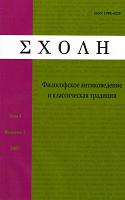Платоновский «Филеб» о едином, многом и среднем (комментарий к фрагменту 14с–18d)
Plato’s Philebus on the one, many and the middle (a note on 14c–18d)
Author(s): Svetlana MesyatsSubject(s): Philosophy
Published by: Новосибирский государственный университет
Keywords: Ancient philosophy; ontology; epistemology; Platonism; textual analysis
Summary/Abstract: The article concerns the ontological dimension of the One-and-Many problem in Plato’s Philebus. A well-known sophistic paradox “unity is plural, while plurality is one” is inspired by the question of identity of the existent things: how a given thing can be identical with itself and simultaneously be determined in many ways in relation to other things? Having distinguished the realms of Being and Becoming, Plato solved the problem of perceptible things to the effect that only the real beings (forms) are deserving to be named unities, while the rest of the things are unified only in their appearance to the extend they are participating in the forms. But this does not eliminate the One-and-Many problem: now it is applied to the forms themselves. How the unified forms are undergoing division in the realm of becoming, and why, taken in their capacity of being existent, they are losing their self-identity and are becoming plurality? In the Philebus Plato introduces the concept of the ‘middle’, something to be found between the unified and undivided form and the indefinite plurality of its perceptible manifestations. Perceived from the prospective of such a ‘middle’ term, the form ceases to appear as a compete and indiscernible unity, on the one hand, or an empty notion, that designate an indefinite plurality of things, on the other. A blend of unity and diversity, the limiter and unlimited, the form becomes a number and logos. Why Plato in the Philebus has stripped the form of its unique self-identity? Probably because he does not describe the structure of the ideal realm in itself, being instead concerned with the structure of our knowledge about it?
Journal: ΣΧΟΛΗ. Философское антиковедение и классическая традиция
- Issue Year: VI/2012
- Issue No: 2
- Page Range: 323-339
- Page Count: 16
- Language: Russian

